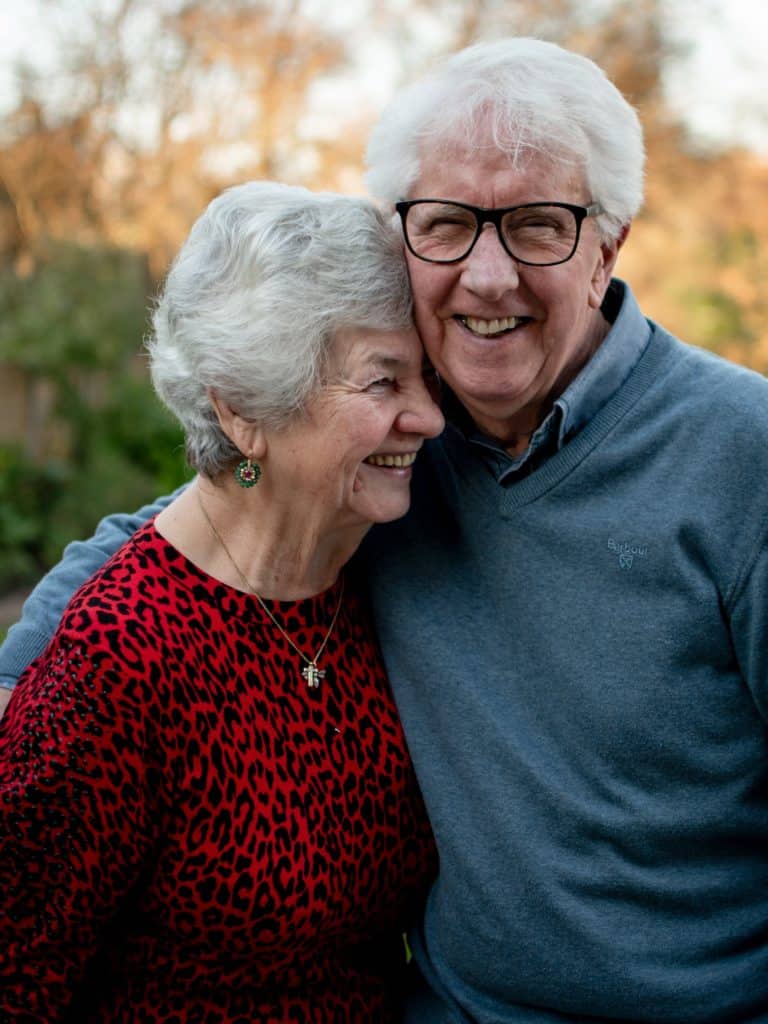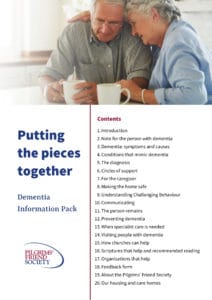Caring for those with dementia, and their carers

Author: Ruth Preston
Starting with an encounter 14 years ago, Helen McKay-Ferguson from our sister charity Pilgrims’ Friend Society shares how the church can play a vital role in looking after those facing dementia, supported by the charity’s relaunched dementia information pack.

As a 22-year-old student, I found myself sitting across the table from a man in a pub in Cardiff as he recounted his experience of caring for his mother. She was 85 and living with Alzheimer’s Disease.
It was one of the first assignments on my journalism course, one of my first experiences of interviewing anyone, and one of my first encounters with someone facing the issue of dementia.
For my interviewee, let’s call him Robert, it was like the floodgates opened. Over the course of the evening, barely pausing to sip his pint, he told me what life had been like in the eight years since his mother’s diagnosis.
At the start, he’d struggled to get support from social services. “It’s like a secret garden and you’ve got to get access,” he reflected, “I just feel that if I wasn’t pushy in a nice, diplomatic, political way then you could be left floundering.”
While Robert struggled to navigate the social care system – everything took what seemed like an inordinately long time – his mother’s illness progressed. He told of how she’d call him up nine times an evening to say the same thing. How at mealtimes she always ate voraciously because she couldn’t remember if she had already eaten that day. How he felt he couldn’t relax when out with friends because he was always watching the clock.
Two years before, he’d given up his job as a lecturer to take care of her full-time. Although he didn’t live with his mother, caring for her amounted to over 60 hours a week.
While Robert was clearly devoted to his mother, the stresses and strains were showing.

At Pilgrims’ Friend Society, part of our mission is to equip the church with the resources it needs to care for older people, as well as caring for those living with dementia in our care homes. According to the Alzheimer’s Research UK, there are currently 850,000 in the UK living with dementia, with 700,000 friends and family caring for them. To help the many who find themselves in situations like Robert’s, and the churches they are part of, we’ve recently updated our dementia information pack.
Entitled ‘Putting the pieces together’, the pack is written by Louise Morse, a Cognitive Behavioural Therapist and expert in dementia. It contains leaflets exploring a whole range of issues relating to dementia including the initial diagnosis, support for the caregiver and understanding challenging behaviour and communication changes.
Crucially from a Christian perspective, the pack is threaded through with scripture and the biblical principle that the person always remains – regardless of their cognition or capacity.
Louise says, “When dementia comes into your life you need all the information you can get – but you don’t have time to read a book about it. Secular advice springs from the understanding that we are simply the sum of our parts, but within a Christian context we see that we are eternal spirit beings in human bodies.”
Back for a moment to Robert and the conversation I had with him all those years ago. Eventually, he did get help through a charity dedicated to carers. His mother started attending the charity’s day centre several afternoons a week, giving him much-needed breathing space to manage the affairs of both his household and his mother’s as well as time for hobbies. Through the organisation he also connected with a counsellor and joined a carers’ support group. On a couple of occasions, he arranged for his mother to go on a residential break, giving him respite.
But here’s the thing. In researching this blog, I Googled the charity and discovered it closed its doors in 2014, citing financial difficulties. Years of austerity measures have taken their toll on the social care sector. If Robert needed to access such services today, would he struggle even more?

In this climate of cuts, and now with the impact of a pandemic to cope with, the role of churches in supporting those in their congregations who are facing dementia is perhaps more crucial than ever. Our pack is designed to be used not just by those in a person’s immediate family, but shared with and browsed by the wider church family. It’s all of our responsibility to be informed and equipped, and prepared to face dementia together.
One last thought about Robert. At the time, I was struck by how a man who was caring for his mother for 60 hours a week would willingly give up a precious evening to talk to a student in a pub. Obviously it was an issue he felt passionate about and wanted to raise awareness of. There was that. At the same time, he agreed to do the interview knowing full well that while the article I wrote would be submitted for an assignment, it wouldn’t necessarily get published.
I came away with the sense that life as a carer can be very lonely. As much as anything, he wanted someone to talk to.
For those in our church families, will we be that listening ear?
The pack is £12 and can be purchased at www.pilgrimsfriend.org.uk/resources/dementia-information-pack, or call 0300 303 1403 to order a copy.
